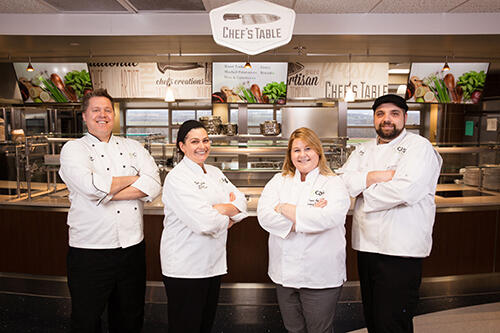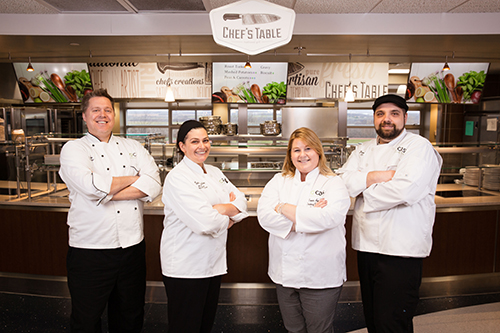
 In the rolling green hills near Tuscany, there is a family who has been raising pigs and sharing their homemade prosciutto and cured cuts of pork with hungry customers for generations.
In the rolling green hills near Tuscany, there is a family who has been raising pigs and sharing their homemade prosciutto and cured cuts of pork with hungry customers for generations.
There, a group of Geneseo campus chefs toured the farm and were then invited by the grandfather into a cozy tasting house, where he ladled homemade soup and sliced samples of the family’s meats, as his grandkids cleared plates from the tables.
“I’ve worked in the food industry for more than 20 years and I’ve never seen anyone enjoy their jobs as much as this family,” says Geneseo Executive Chef Matthew Laurence. “They were so proud of what they produce. It was a tremendous experience. I would like to instill that pride on our campus and have everyone excited about what we share here.”
Laurence, two other chefs and Director of Culinary Operations Jonna Anne spent 10 days exploring Italy last summer, as part of a new Campus Auxiliary Services program for those who plan dining options in the on-campus restaurants and cafes, and create meals for 5,000 students. Faculty Fellow for International Programs Wes Kennison ’79 led the group; he has had decades-long relationships with families, farmers and restaurateurs in the area.
“We wanted to give our culinary professionals a real-world, ground-level international experience that would better inform them for their work on a daily basis,” says CAS Executive Director Mark Scott. “As we become a more global society, and to the extent that our campus has become more globalized, our students bring with them a whole different set of expectations and appreciation for food and its link to the cultures it comes from. This helps us become better at providing culturally rich and accurate dining.”
Eating is simple, but understanding food — and its production, delivery and culture — is complex, say Scott and Kennison. How does it shape economic realities in the regions? How does food affect government policy? How does it affect families and how they interact with each other?
The chefs explored these questions as well as how history has directly affected Italian food in different regions as they visited family farms. They explored the farm-to-table culture of Italian eating, and the concept of “slow food.” They also partnered with pasta-maker Barilla and cooked with chefs at the Barilla academy. Barilla owns a pasta-making facility in Avon, outside Geneseo, and has led cooking demonstrations for students on campus.
Chefs also helped prep for meals at two restaurants in the medieval city of Siena, gaining an authentic taste for food service.
“In any restaurant you walked into, you were made to feel part of the family,” says Laurence. Families who owned eateries focused on foods grown locally.
In Italy, eating is as much about the experience of a meal as it is about the food itself, he said. That’s what they hope to bring back to campus: an appreciation for food and the process of getting it to the table — a sense of comfort in creative dining, and an appreciation for our own regional harvests.
“We will be introducing some of these ideas and recipes in our campus restaurants” to encourage that family feel, says Laurence.
It also reinforces CAS’ mission of using local foods. Among its many endeavors, CAS purchases all of its milk and dairy from Upstate Farms, a cooperative of more than 360 local family farms. CAS also sources as much fresh produce as possible from more than 20 local farms through a distributor in Rochester.
Last fall, campus chefs introduced recipes they learned in Italy, including a baked fresh focaccia bread sandwich, with grilled vegetables, and a risotto served at the ROMA Italian eatery in Letchworth Dining Complex.
On Dec. 7, Anne hosted a Ben Comune Festival on campus, in honor of a traditional Italian event. The CAS chefs each cooked a recipe brought home from Italy, with learning sessions for students looking for Italian skills.
In the short term, Scott hopes the chefs’ experience will elevate dining at Geneseo, and an appreciation for how food drives communities and brings people together.
"The care that goes into every aspect of daily life in Italy is quite amazing,” says chef Michelle Halloran. “What I took away from this trip is that ‘slow food’ equals a happy heart, and, in turn, a happy life. Every day I try to remind myself to slow down and enjoy the process of preparing food."
Scott sees the program as just the beginning for Geneseo.
He hopes to provide an opportunity for CAS student workers in campus dining to have a similar international experience, an unconventional learning experience at Geneseo, in which they can gain new skills and perspective. People have conversations — they build community and solve tough problems — around meals.
“From the first day I set foot on this campus, it was ingrained in me that it’s important that we integrate every part of the campus experience into student learning,” says Scott. “We’ve taken that very seriously. CAS is known for food. It’s natural for us to extend learning in this way.”
This feature was published in the Winter 2017 issue of the Scene magazine. View the chefs' Italy photo album.
— By Kris Dreessen